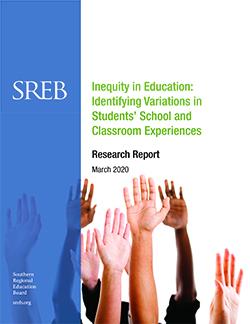Inequity in Education: Identifying Variations in Students’ School and Classroom Experiences
Research Report
 This research report presents the
results of a study designed by SREB’s Research and Accountability
team to identify and unpack sources of inequity in K-12 public
education. The study examined results from student surveys
administered in 2018 to over 7,800 students in 15 states across
the United States. Grounded in SREB’s research-based Key Practices for
quality education, student surveys probe whether schools may be
setting a low bar for achievement or allowing biased thinking
about students’ academic ability to affect their school climate.
This research report presents the
results of a study designed by SREB’s Research and Accountability
team to identify and unpack sources of inequity in K-12 public
education. The study examined results from student surveys
administered in 2018 to over 7,800 students in 15 states across
the United States. Grounded in SREB’s research-based Key Practices for
quality education, student surveys probe whether schools may be
setting a low bar for achievement or allowing biased thinking
about students’ academic ability to affect their school climate.
The authors sought to determine: (1) whether students’ school and classroom experiences differed more between schools or within a single school; (2) whether students who met readiness benchmarks on assessments like the ACT or SAT reported different experiences than students who did not meet benchmarks; and (3) which variables might explain these differences.
Results showed greater inequities between students’ reported experiences within the same school than between students at different schools. For example, students who met readiness benchmarks were more likely to report having positive school and classroom experiences — such as opportunities to complete project-based assignments, challenging literacy and math instruction, and a belief that their school has a culture of high expectations — than peers who did not meet benchmarks.
Prior academic performance was not the sole factor in whether students were more likely to report having positive school and classroom experiences. Students who were on track to graduate and reported that their parents were good sources of information and support related to their academic and career goals were more likely to report having positive experiences at school. These variables were bigger determinants of students’ likelihood to report having positive experiences than demographic variables like race or socioeconomic status.
The report provides recommendations for how schools and career and technology centers can combat inequity by providing engaging instruction and creating encouraging communities that positively impact students’ school and classroom experiences.
Recommended citation: Purser, R., Egelson, P., Fuga, C., & Resonant Education. (2020). Inequity in education: Identifying variations in students’ school and classroom experiences. Atlanta, GA: Southern Regional Education Board.


